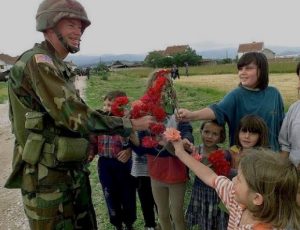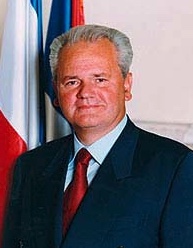
[This article is representative of many that appeared in Western media within days of the end of the Kosovo war. Even now, with far more information in the public domain, journalists continue to report these allegations which have long-since been discredited. To illustrate the sustained power of propaganda, we have added links which present a very different picture but have not as yet had much affect on changing the official story.]
The Wall Street Journal
Editorial
June 23, 1999

Deconstructing Serbia
As the last Serb forces withdrew from Kosovo Sunday, reporters and KFOR troops on the ground began uncovering new mass grave sites. Each village, it appears, has its own tale of atrocities, written in blood-soaked clothing, burned-out homes or in the discovery of hastily buried human remains.
British government officials estimate that at least 10,000 ethnic Albanians were killed in Serb massacres. [See https://x.com/ResearchTeam/status/1952288550977753544]
The calculated campaign of terror perpetrated by Milosevic’s forces is worth recounting, and remembering, not just because so many in the West doubted that such atrocities took place. Perhaps in the future there will be more willingness to pay heed when tens or hundreds of thousands of fleeing refugees tell eerily consistent stories of war crimes.

More important, this record ought to inform the critical next step for Bill Clinton and other NATO leaders in their reconstruction plan for the Balkans.
The ostensible purpose of the massive aid effort that got under way at the G-8 summit this weekend isn’t simply to repair the infrastructure in Kosovo damaged by the NATO air offensive or to aid impoverished neighboring countries that have been sheltering Albanian refugees.
The idea is far more ambitious: the rehabilitation of civil society in the entire region through economic regeneration and institution building. The argument being made is that this rehabilitation cannot succeed unless Serbia itself joins the Western community of nations.

True enough, but that begs the question: How do you rehabilitate Serbia? As British Prime Minister Tony Blair said recently “The world cannot help you [the Serbs] rebuild your country while Milosevic is at its head. And nor will the world understand, as the full extent of these atrocities is revealed, if you just turn a blind eye to the truth and pretend it is nothing to do with you. This is your country. This evil was carried out by your soldiers and by your leaders.”

Once again Mr. Blair is far ahead of his colleagues. Throughout the bombing campaign, NATO insisted that the air attacks were aimed at Milosevic and his police forces, not the Serbian people, who were innocent. This isn’t the same as saying that the Serbian people don’t share in some of the culpability, if indirectly.
In rural Serbia, where the sole source of information was an unrelenting stream of propaganda from state television, ignorance combined with years of brainwashing helps explain why Kosovars were regarded as subhumans.
But what of the Serbian intelligentsia? Only a few brave dissidents dared support the NATO war; those who did, such as Sonja Biserko — director of the Serbian branch of the Helsinki Committee for Human Rights — were vilified and forced to flee Belgrade. Even as the Orthodox Church finally called for Milosevic’s removal last week, it denied the jurisdiction of the war crimes tribunal and refused to acknowledge the crimes committed by Milosevic and Serbian soldiers in the name of national identity.

Milosevic’s removal would be no guarantee of national regeneration. But without that minimum step, there can be no person of authority to acknowledge the commission of crimes, accept a measure of guilt and declare a desire to atone.
Though NATO shied away from the challenge of removing him, Milosevic remains badly weakened. Returning Serbian soldiers are demonstrating for back pay.
The Orthodox Church, whatever its motives, has turned against him. NATO’s destruction of communication and other infrastructure has achieved a measure of decentralization that will help local opposition authorities rise up and challenge Milosevic’s power base. And the bands of organized criminals, military leaders and others Milosevic allowed to profit from his rule will soon find there are no spoils left to divide. One or more of these forces will eventually see that he is cast aside.
Until then, whatever humanitarian assistance is truly necessary to help the Serbian people ought to be brought in under the auspices of NATO governments — not the United Nations. It should be delivered directly by the donors, not by the Milosevic regime.
In defeat, defiance; in victory, magnanimity, wrote Churchill. Milosevic has certainly been defiant in defeat. The best gift NATO could bestow on the people of Serbia is to help them recognize the lies that have governed their lives so that real reconstruction can begin.
[A few months later the WSJ carried a further article on the Kosovo war, telling a completely different story . Much closer to the truth but still too little too late to undo the harm of the original article.See: https://www.wsj.com/public/resources/documents/pearl123199.htm]